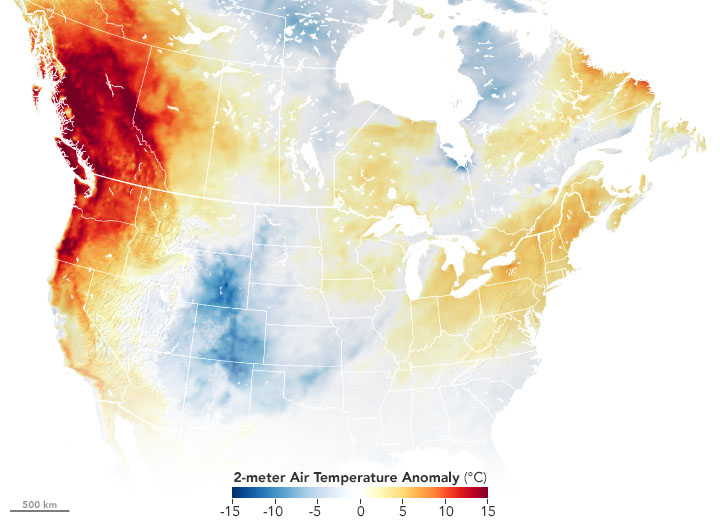
Written under the category "climate solutions"
Large swaths of the world are sweltering amid a scorching hot summer. July is shaping up to be the Earth’s hottest month in recorded history, with heat waves expected to become more frequent and unrelenting.
But even those who have never experienced this kind of extreme heat before have the potential to adapt to endure it better. “Our bodies are remarkable things,” said Stefan Wheat, an emergency physician at the University of Washington School of Medicine who specializes in climate change and health.
“Our bodies are well adapted to be able to acclimate to heat under the right circumstances.”
Becoming more accustomed to hotter temperatures, though, takes time. And it shouldn’t be attempted by going out in the heat and doing too much too quickly. “Someone who is exposed to a high heat index and is not acclimated will not have these adaptive measures in place and can suffer significant heat-related illness,” Wheat said.
Here are some safe ways to train your body to do better in the heat:
Getting used to heat
The best way to build up your body’s tolerance is by exposing yourself safely to short bouts of heat and humidity and gradually increasing the length of exposure, a process known as heat acclimatization, said W. Larry Kenney, a professor of physiology and kinesiology at Penn State.Allowing your body to experience heat through these repeated and controlled exposures, especially if you’re doing physical activity, can trigger physiological adaptations that improve your ability to withstand hotter temperatures and can help lower the risk of heat-related illness and death, he said.
For one, the body’s plasma volume expands, increasing blood volume, he said. That means your heart doesn’t have to work as hard and your body has more fluid to support sweating, a critical function to keep you cool, he said. As your body becomes more accustomed to heat, you should also be able to sweat more efficiently and retain electrolytes better.
Some hallmarks of heat acclimatization include maintaining a lower heart rate and core temperature, as well as sweating more, particularly on your arms and legs, Kenney said.
“People who live in hot environments for most of their lives are already acclimatized,” he added. But those who live in cooler environments can get there with some training. It can typically take about a week or two to become fully acclimatized, experts say.
“If you wait until the heat wave is upon us and it’s extremely severe, it’s probably too late and people should try to stay in air-conditioned environments,” Kenney said. “The best way to safely tolerate those heat wave conditions would be to prepare for them by heat acclimating ahead of time.”
How to build heat tolerance
Before starting, bear in mind that your body’s ability to adapt can be affected by a variety of factors including age, underlying medical conditions and whether you’re taking certain medications. Improving your fitness and staying well hydrated can also help you better tolerate heat, said Rebecca Stearns, chief operating officer of the Korey Stringer Institute at the University of Connecticut.Here’s how experts suggest building tolerance:
1. Ease in. For people starting at a lower baseline fitness level and whose bodies aren’t adapted at all, Kenney recommends starting with 10 to 15 minutes on the first day and adding five minutes each subsequent day or every other day. Make sure you’re only attempting a low level of physical activity, such as walking.
“You can’t go out on that first hot day and jog around the block for half an hour,” he said.
The Centers for Disease Control and Prevention’s National Institute for Occupational Safety and Health also provides recommended acclimatization schedules for people who work outdoors.
2. Move around. It’s important to do physical activities during these heat exposures because it can help maximize the effects, Stearns said.
“The degree to which you become heat acclimatized is going to depend on the amount of stress and the intensity of the exercise session that you’re doing,” she said.
3. Listen to your body. “If their body starts to tell them, ‘I’m overheating. I’m feeling unwell,’ it’s better to stop because your ability to gut it out really can’t overcome physiology,” Kenney said.
There are heat and humidity levels that people cannot physiologically adapt to even if they’re healthy, said Kenney, who has studied those limits. His peer-reviewed research findings suggest that the limit for young healthy people is around a wet bulb temperature of 88 degrees Fahrenheit, or 88 degrees at 100 percent relative humidity.
4. Rest. Remember your body needs time to recover from heat stress, ideally by sleeping in a cool environment, Stearns said. Without these recovery periods, your body can become less resilient to heat during later exposures and you could be increasing your risk of heat illness, she said.
Air conditioning is your friend, even if you’re trying to get your body used to the heat.
“A lot of people are under the impression that if you regularly stay in air conditioning, that’s a negative adaptation to heat waves,” Kenney said. “It’s really the safest way to get through heat waves, and it’s certainly possible to spend most of your time in air-conditioned environments and still acclimate yourself to the heat by going out periodically.”








